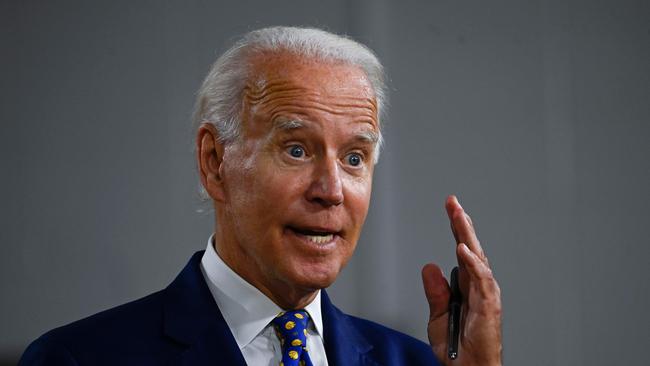In strange times, Donald Trump can still win this election
Between two unsatisfactory candidates the US election is an open race.

Is Trump cooked?
On November 3, barely 90 days away, will the gigantic, fantastic, psychedelic, unbelievable reality show of Donald Trump’s presidency come to a crashing halt, and the sleepy, somnolent, simpering tones of Uncle Joe Biden, Great Uncle Joe, replace the orange-haired tweeter-in-chief?
Simon Jackman, head of Sydney University’s US Studies Centre, with a lifetime studying American polls, answers: “No, I don’t think Trump’s cooked. The poll error in the swing states was so big in 2016.”
Jackman isn’t saying Trump will win. But the contest remains open.
All the numbers are terrible for Trump, but Jackman refers me to elections past when candidates with big poll leads in July and August still lost in November.
Paradoxically, bad polls could even help Trump. He is a much stronger insurgent than he is establishment leader, even of a new establishment centred on himself.
Trump is running on four issues: who is best to revive the economy; law and order; China; and Biden’s manifest weaknesses.
He is not running on how he handled the COVID-19 pandemic, which is still raging, with new milestones this week. US cases are nearly five million, with more than 155,000 dead. Florida broke its record for daily deaths. Other states have been posting nasty records. Many states, Republican and Democrat, are imposing new restrictions.
All the numbers are bad for Trump. And it’s all down to the virus. If the polls are right, COVID-19 will take the presidency from Trump and give it to Biden.
The numbers could not be worse for Trump. The US economy contracted by a staggering, record 9.5 per cent in the second quarter and 1.4 million more people applied for unemployment benefits this week.
The virus is not Trump’s fault. But, whereas polls still show Trump leading Biden handsomely on who would manage the economy better, they show him way behind on who would manage the virus better. A big majority condemn Trump’s handling of the virus.
The polls in 2016 showed how unreliable they are when an election is close. But their forecasts were generally within their margin of error. As the polls stand now, it’s not close.
Fully recognising polls are a snapshot not a prediction, any analysis nonetheless must start with the polls. The Economist’s election forecaster gives Trump a one-in-10 chance of winning and Biden a nine-in-10 chance. Website 538, which is not as authoritative as it claims but still works hard to analyse the data, has weighted national polls to put Biden at 50.1 per cent and Trump at 43.6. The realclearpolitics poll average has Biden at 49.9 per cent and Trump at 41.6.
The veteran guru of US election analysts, Charlie Cook, the smartest election watcher I’ve ever met, thinks Biden needs to win the popular vote by 3 or 4 per cent to win the electoral college and the presidency. Three or 4 per cent is a tight election. If Biden wins by 7 or 8 per cent, Trump loses in a landslide.
But paradoxically, that very analysis shows that Trump’s task, while formidable, is not impossible. If Biden leads now by 8 per cent, Trump has to cut that in half and then just a little bit more to put the election potentially on a knife edge again.
It’s going in the wrong direction for Trump right now, and he’ll have to start the shift fairly soon. He was mostly behind Hillary Clinton last time, but he was not behind by nearly as much this close to the election.
The reason Biden needs a pretty big win in the popular vote is because of a modest pro-rural gerrymander in the electoral college and a safe-seat syndrome.
Every state elects a delegation to the electoral college to choose the president. The delegation is equal in size to the number of House of Representatives congressmen in every state, plus the two senators every state has. The number of congressmen is based on a state’s population size, so there is no gerrymander there. But California, with 40 million people, gets two senators, as does Wyoming, with a little over half a million people.
This is part of the genius of the US system. It prevents total domination by big states. Because in this period Republicans win all the small rural states, they benefit from a modest, non-partisan gerrymander that can be decisive in a close contest.
The other big disconnect between the popular vote and the electoral college outcome derives from a kind of safe-seat syndrome and has nothing to do with any gerrymander, even an unintentional one. The two most populous states, California and New York, are, at this time, always easily won by the Democrat. As a result, the Republican doesn’t campaign there and the vote count is much bigger than if he did.
The two big states a Republican must win to become president are Florida and Texas. Florida is always close. Therefore, as with a parliamentary system, the Democrats “waste” a lot of votes in California and New York. This bolsters their popular vote number. It doesn’t mean US elections are undemocratic, or thwart the will of the people. If it were a purely popular vote contest, the Republicans would campaign in California and New York. No system is perfect.
There are polls that have Biden ahead in Texas but most pundits think Trump will ultimately win Texas.
It can be helpful to think of the US as five electorally significant regions — the northeast coast, the south, the midwest, the Rocky Mountain states and the west coast. In recent decades the pattern is that the Democrats win the northeast and the west coast, the Republicans win the south. Real battle is joined in the midwest and the Rocky Mountain states.
RCP has an electoral college map of the US based on polls as they stand, assigning each state to whoever is leading, with no state regarded as too close to call. On that basis, if the election were held today and the polls were accurate, Biden would win 352 electoral college votes and Trump 186.
Cook, like many analysts, believes the election will be decided by six battleground states. From largest to smallest they are Florida (29 electoral college votes), Pennsylvania (20), Michigan (16), North Carolina (15), Arizona (11) and Wisconsin (10). Trump is well behind in all those states, as he was in 2016.
If, like then, he were to unexpectedly win all six key battleground states he would secure the electoral college by 287 to Biden’s 251. There are 538 electoral college votes so the winner needs 270. So Trump could lose from that list of six one of Michigan, North Carolina, Arizona or Wisconsin and still win the presidency. If everything else held steady, he could not lose Florida or Pennsylvania and still win the presidency.
Across the battleground states, Biden leads by more than Clinton did at this stage last time. More importantly perhaps, on the critical question of how the country is going, often a key predictor of whether a president gets re-elected, 69 per cent of Americans say their country is on the wrong track, and only 23 per cent say it’s going in the right direction.
So, given all these difficult numbers, why is it still entirely possible Trump could win?
First, Trump attracts people to vote who don’t normally vote and who don’t vote in other elections. That’s partly what so fooled pollsters in 2016. A lot of Trump voters won’t admit to voting for him, sometimes won’t even admit to voting. They don’t answer pollsters. They are very elusive.
Second, Trump’s approval rating right now, averaged across all the polls, is 43 per cent. You can get outlier polls that put him higher or lower. That’s why the average of polls is so useful. Forty-three per cent is probably just a bit below competitive for Trump. The feeling always was that at 45, he’s a shot; at 40, he’s probably cooked. The critical question now is which way the polls move.
Third, the contest hasn’t really been engaged yet. Biden is not disliked by socially conservative, midwest, white blue-collar voters in the way Hillary Clinton was. But remember that before she met Trump, Clinton was the most admired woman in America, with no end of fawning profiles, media tributes, warm and fuzzy moments.
Ross Douthat in The New York Times once offered a metaphor about not engaging directly in combat with Trump. Don’t wrestle with a pig in mud. The pig enjoys it and you get dirty.
In hand-to-hand combat, Trump is extremely effective and immensely destructive. Consider Trump’s nicknames for, successively, Clinton, Marco Rubio, Ted Cruz and Elizabeth Warren. They were: crooked Hillary, little Marco, lyin’ Ted and Pocahontas (on the basis of Warren’s ridiculous claim of Native American ancestry). I don’t like that kind of campaigning. It’s crude, offensive, coarse. It represents a tragic decline in American political culture. But it has been deadly effective. And now, given the flood of wild, abusive, mad things his opponents have said about Trump, none of them really comes to the matter with clean hands. They don’t have the moral credibility to complain effectively.
Biden is potentially an extremely weak candidate. For a former vice-president and clear frontrunner, he performed abysmally in the early Democratic primaries. But, whereas COVID-19 is almost perfectly designed to hurt Trump, depriving him of his economic narrative, his mass rallies, his good news bias and requiring him to reach out across party lines to Democrat state governors (which is not in his political DNA), the virus is almost unbelievably well designed to protect and help Biden.
Trump says a lot of weird things, but they are weird in a rational way. He either tells lies or gets his facts wrong. Biden does all that almost as much as Trump, but he also says things that are weird in completely irrational ways, things that suggest the computer in the brain has lost control. He famously said in a primary debate that since Bernie Sanders opposed a gun control measure, 150 million Americans had been killed in gun crimes.
One hundred and fifty million? That sort of gaffe is not rare for Biden.
The virus has allowed Biden to go into witness protection in his basement. From his campaign’s point of view, this is absolutely the best place for him.
Trump derives both his credibility, and any claims he has for a second term, on the basis of what he gets done. Biden presents himself merely as the non-Trump and is willing to go down any zeitgeist verbal line that is momentarily popular, constrained only by his smart advisers, who try to prevent entering iron-clad commitments that will cost votes.
Biden has embraced a reckless and extreme economic policy agenda. It should frighten voters. But he will never be able to implement it. Nor was Trump able to implement his promises. Trump was going to cut taxes, increase spending and balance the budget. He did the first two but massively blew out the deficit, and this is long before the virus came around.
Trump is better for the economy than Biden, but Trump’s performance means Biden probably gets nearly a free pass on the wacky and extreme nature of many of his policies. The electorate apparently has faith that Biden won’t do what he says. On China, Biden was a notable wimp even by the standards of the wimpish Obama White House. Everything depends on who he appoints. A horrible rumour is circulating that John Kerry, sublimely ineffective at his best, could return as secretary of state.
Biden’s choice of vice-presidential running mate, and the three presidential debates, are more important than such things have been in the past.
These are two profoundly unsatisfactory candidates, but that’s democracy for you. It’s still anyone’s race.



